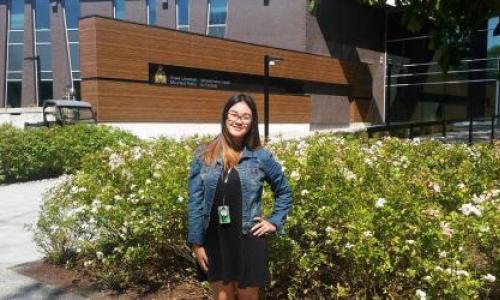
Whether you are already involved in student clubs or plan to get involved, I can reassure you that employers value the unique skills and experience you develop from giving back to your community. After reflecting on my own club involvements, I was able to draw connections between my club positions and my current co-op role. I will take you through my journey on how my campus student engagement lead me to my first co-op job!
Getting Involved
Coming into university as a first year, I knew I had interests in Human Resources (HR) and Marketing. To further explore these passions, I decided to join the Student Marketing Association (SMA) and Business Administration Student Society (BASS). I held various positions such as Brand Ambassador, Marketing Project Coordinator, HR Coordinator and Corporate Relations Coordinator. Ultimately, those roles led me to my current role as Vice President of Human Resources for SMA, which I find relates most closely to my current co-op role as a HR/Recruiting Assistant with Inland Group.
The Similarities
1. Job Duties
SMA's VP of HR, I facilitate the recruitment cycle for all positions within the organization. My responsibilities include reviewing resumes, creating application questions, designing interview guides, scheduling interviews and interviewing candidates. As a HR/Recruiting Assistant, I am doing those same tasks, but in a real-life work environment. Having this prior recruitment experience made adapting to my new job much easier as I was already familiar with the recruitment process.
2. Professionalism
As a Corporate Relations Coordinator for BASS, I was responsible for seeking sponsorships/partnerships with external organizations on behalf of BASS. Professionalism played a huge part as I had to contact industry professionals through emails, calls, coffee chats and LinkedIn. This role definitely helped me develop professional communication both in person and online. In the workplace, demonstrating professionalism through timely response to emails, taking initiative and being accountable for one’s actions as well as being respectful to authority will impress your managers.
3. Communicating and Collaborating with Others
No matter what co-op role or career you choose to pursue, I can guarantee that you will have to communicate and work with others. Whether it is with your managers, co-workers or clients, being able to effectively collaborate and communicate with others will help you succeed in any role.
If anything, being involved in clubs shows that you are able to work in a team and communicate with others. My role often requires me to collaborate and communicate with managers and co-workers from different departments such as Marketing and Accounts Receivables.
The Differences (What I Learnt)
1. Expectations Versus Reality
At the start of every semester, my club would run one recruitment cycle for all the positions needed for that semester. This recruitment cycle would wrap up in about a month. I expected a real company to be similar. However, in reality, recruitment cycles don’t always end as quickly as you plan for and some roles may require recruiting on an on-going basis. I have experienced cycles that lasted throughout my whole co-op term! It can be quite the process from getting job requisitions approved to finally onboarding a candidate.
2. Not Everything is as Simple as It Seems
When you get “hired” for student clubs, you pretty much accept the role and begin your duties. However, in a real company, there is usually paperwork that follows when someone is hired. As part of my role, I draft offer letters for new hires. The first few things that usually come to mind for most people is to include wages, benefits, responsibilities and who they would report to.
What I didn’t realize was the number of legal components that had to be taken into consideration. As Inland has 35 locations across North America, depending on whether the hire was from the US or Canada, I had to refer to different employment laws in the letter. Then depending on if that location is unionized or not, I had to ensure I reflected-upon the appropriate union clauses. On top of that, position skill level, duration and whether the candidate was an internal or external hire would alter the language of the letter. Simple, right?
3. Using Creativity to Take Initiative
When I started my co-op term, my company only posted jobs on our website and LinkedIn, which generated a low number of applicants. Fortunately, I got the opportunity to create change and implement some campaigns to attract more candidates.
Firstly, I assisted in managing a recruitment campaign on Indeed where I revamped job descriptions and made job postings to reflect our company’s culture, values and employment brand. As a result, we started to notice a significant increase in the number of applicants for every job we featured on Indeed.

In addition, I implemented a #TechTakeover Social Media campaign to support our technician hiring efforts. I interviewed some of our techs on their experience working at Inland and even got techs from other branches to submit fun pictures/videos that capture a day in the life of a tech. Through collaborating with our marketing team, we featured our techs’ stories on our Instagram and Facebook. I was able to showcase our supportive team culture and great work environment while enhancing Inland’s employment brand.
It feels very rewarding to see big changes result from my small actions. Sometimes in clubs, a small action won't lead to much change. To know that my work benefited and significantly impacted the company is what I think made my co-op term successful.
Big Takeaway?
Through all my campus involvements , I have developed so many transferable skills and unique experiences that I felt contributed to the success of my first co-op experience. Beyond helping me secure my co-op job, my club involvement eased the transition into my role and helped differentiate me from my peers. So, if you want to be one step closer to finding your dream co-op, I suggest starting with community involvement!
Beyond the Blog
-
Check out SFU's I Want to Volunteer website for amazing on and off campus















